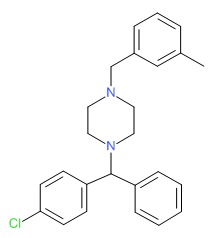NCBI Bookshelf. A service of the National Library of Medicine, National Institutes of Health.
LiverTox: Clinical and Research Information on Drug-Induced Liver Injury [Internet]. Bethesda (MD): National Institute of Diabetes and Digestive and Kidney Diseases; 2012-.

LiverTox: Clinical and Research Information on Drug-Induced Liver Injury [Internet].
Show detailsOVERVIEW
Introduction
Meclizine is a first generation antihistamine that is used largely to treat vertigo and motion sickness. Meclizine has not been linked to instances of clinically apparent acute liver injury.
Background
Meclizine (mek' li zeen) is a first generation antihistamine that belongs to the piperazine class of these agents (with cyclizine and hydroxyzine) which are used largely for their antiemetic and sedative effects. Meclizine is used mostly for the treatment of vertigo and symptoms of nausea, vomiting and dizziness associated with motion sickness. Meclizine was first approved for use in the United States in 1957 and is available in tablets and capsules of 12.5, 25 and 50 mg in multiple generic forms and under the trade name Antivert. Meclizine is available in both prescription and nonprescription forms. The recommended adult oral dose for motion sickness is 25 to 50 mg taken one hour before travel. The recommended dose for vertigo is 25 to 100 mg daily in divided doses. Common side effects include sedation, impairment of motor function, confusion, dizziness, blurred vision, dry mouth and throat, palpitations, tachycardia, abdominal distress, constipation and headache. Antihistamines can worsen urinary retention and glaucoma.
Hepatotoxicity
Despite widespread use, meclizine has not been linked to liver test abnormalities or to clinically apparent liver injury. The reason for its safety may relate to low daily dose and limited duration of use.
Likelihood score: E (unlikely to be a cause of clinically apparent liver injury).
References on the safety and potential hepatotoxicity of antihistamines are given together after the Overview section on Antihistamines.
Drug Class: Antihistamines
PRODUCT INFORMATION
REPRESENTATIVE TRADE NAMES
Meclizine – Generic, Antivert®
DRUG CLASS
Antihistamines
Product labeling at DailyMed, National Library of Medicine, NIH
CHEMICAL FORMULA AND STRUCTURE
| DRUG | CAS REGISTRY NUMBER | MOLECULAR FORMULA | STRUCTURE |
|---|---|---|---|
| Meclizine | 569-65-3 | C25-H27-Cl-N2 |
 |
- Meclizine.[StatPearls. 2024]Meclizine.Houston BT, Patel P, Chowdhury YS. StatPearls. 2024 Jan
- Meclizine metabolism and pharmacokinetics: formulation on its absorption.[J Clin Pharmacol. 2012]Meclizine metabolism and pharmacokinetics: formulation on its absorption.Wang Z, Lee B, Pearce D, Qian S, Wang Y, Zhang Q, Chow MS. J Clin Pharmacol. 2012 Sep; 52(9):1343-9. Epub 2011 Sep 8.
- Unraveling the Structure of Meclizine Dihydrochloride with MicroED.[bioRxiv. 2023]Unraveling the Structure of Meclizine Dihydrochloride with MicroED.Lin J, Unge J, Gonen T. bioRxiv. 2023 Sep 6; . Epub 2023 Sep 6.
- Review Promethazine.[LiverTox: Clinical and Researc...]Review Promethazine.. LiverTox: Clinical and Research Information on Drug-Induced Liver Injury. 2012
- Review Dimenhydrinate.[LiverTox: Clinical and Researc...]Review Dimenhydrinate.. LiverTox: Clinical and Research Information on Drug-Induced Liver Injury. 2012
- Meclizine - LiverToxMeclizine - LiverTox
Your browsing activity is empty.
Activity recording is turned off.
See more...